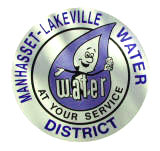Conservation:
Lawn sprinkling continues to be the leading non-essential water use and the District will continue a policy whereby odd-numbered houses may sprinkle on odd-numbered days and even-numbered houses on even-numbered days. Rain sensors or moisture gauges are required on all automatic systems and must be capable of turning off the system in the event of rain. No sprinkling is allowed between 10:00 a.m. and 4:00 p.m. The daily conscientious use of water will help preserve our most precious resource for future generations and will also save energy and money.Ground Water Protection:
Hazardous household chemicals such as ails, paints, and cleaning agents should never be dumped in the yard or disposed of in the household trash. Service stations are required to accept used motor oil. Some localities have designated collection areas and times for the drop-off of hazardous; products. Cornell Cooperative Extension can provide you with Information on how to handle and properly dispose of hazardous household chemicals in your area.Choose biodegradable insecticides and fungicides that break down into harmless substances in 2 to 21 days. depending on the chemical composition, Recommendations on insecticide and fungicide use can also be obtained by calling Cornell Cooperative Extension.
Long Island groundwater quality ranks among the best in the nation. The drinking water source is continuously monitored by the water suppliers, New York State and Nassau County agencies.
In order to maintain a continuous supply of clean, usable water, chemical products such as pesticides, furniture polish, battery acid, motor oil, kerosene, paint and paint thinners must be disposed of properly. Nassau County has a program called S.T.O.P. (STOP THROWING OUT POLLUTANTS). whereby a variety of household chemicals are collected for proper disposal. Other local agencies have implemented similar programs. More programs of this sort must be encouraged elsewhere in New York State so homeowners have ready access to proper disposal methods.
A plentiful quantity of high quality water for today and the future is a goal we must strive to achieve. We can reach this goal if we each take responsibility for our own actions and work together to wisely manage our water resources.
